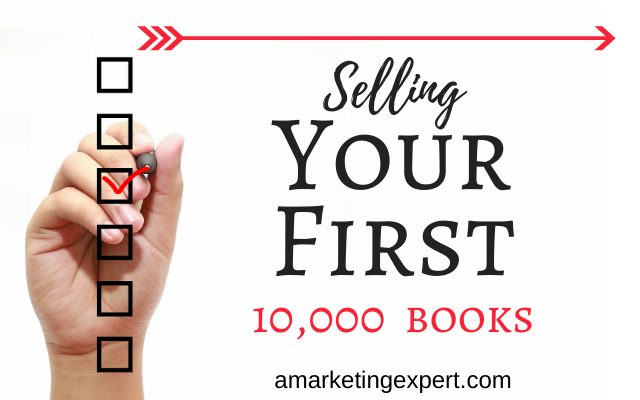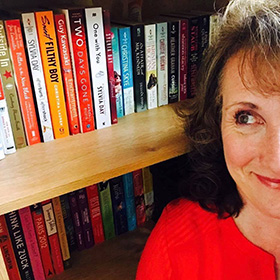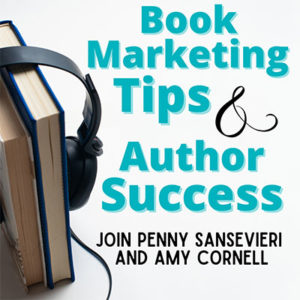Are you marketing to the right readers? Are you sure?
When I teach and stand in a room of authors and say, “What do you most want to learn?” The answers are sometimes a little bit all over the board, but one of the biggest pieces of what it always comes down to is book sales.
But wait – be sure to click over and subscribe to our book marketing podcast to get ALL the tips and recommendations for this topic, below is just a snippet of everything we covered!
Sometimes it’s about fame. Sometimes it’s about, “I want my book to be a movie,” but those are end results of a whole bunch of micro goals that you have to have in order to get to that place where you’re seeing the Amazon bestseller flag on your book, and you’re selling books like crazy. What we want to focus on for this first few podcasts that we’re going to do is book sales.
By the time I get on the phone with an author and I talk to them about our marketing, Amy has already gone through and vetted them. She’s had a conversation in email with them. She’s talked about their goals.
She’s looked at their website or their book cover if their book is already out. Amy, in your extensive experience of vetting folks that come into our company, talk to me a little bit about what you’re seeing in terms of where authors are asking about and what they need to focus on to make sales happen.
All the pieces have to come together in order to get to the point where you’re selling books consistently. You’ve done this for a long time. You do this for a living. You know what you’re doing and it still takes a lot of consistent hard work. The pieces all have to come together, otherwise, you should be able to publish a book and wake up the next day with it being an automatic bestseller.
That’s not how it works at all. But I did want to take a bragging moment that even knowing what we know, it doesn’t absolve us of the consistent strategic planning that you have to do in order to make a book a success.
People look at my book, and they say, “Well, you’re a marketing person, of course, you’re going to have this bestseller record.” First off, I’m in a super non-sexy category. Book marketing — I’m sorry, I know we’re doing a podcast on this. Book marketing is kind of like flossing. Like we all know we need to floss, but you go to the dentist and they ask, “Are you flossing every day?” You’re kind of like, “Well…”
We all lie to be honest. Like, “I’m flossing in my head.” “I meant to market my book last week.” “I meant to market my book but when I get around to it…” So, first off, it’s been a super non-sexy category. Secondly, we’ve been doing this for 20 years, and you could say, “Well, it’s a major platform,” and it isn’t. I mean, you still have to work at it.
Focus on Building Relationships
When authors say, “I need to get more readers for my book.” I’ll have a conversation with them and say, “How about you focus on building relationships?” Because one of the things that you and I talked about with regards to the Amazon book was, I spent a lot of time building relationships with people,.
The people that showed up for you are our regulars. They’re the people that respond to pieces we put in the newsletter. They are the people who engage with us on social media, and those are the people that showed up when you released the book and helped make it a success.
Those relationships are also built on my own integrity when I put out a book. So, I’m not going to put out a book that is subpar. I may not always hit it out of the park with books. Sometimes I think, “Oh, I maybe should have added a chapter here or there.” We all know as authors that the minute you publish a book, the first thing you think of is, “Oh, I wish I would have done X.”
Everything can be edited and we always think about that afterwards. But I always try to put out a really quality book and to that end, that is one of the big things – because the thing that you leave your readers with is your book. If your book is subpar, that reader ends at being a reader. They will never morph into a relationship, which is the thing that helps you sell more books.
A reader will buy one book, but somebody that you’ve established a relationship will buy all of your books. Aim for that. Why aim for one sale when you can aim for sales for every single book that you put out there?
Audience Focus
I think the authors that are most successful that we work with are really in tune with who they’re writing for. An example that I always come back to is if you can describe who your reader is in just a couple words like, “Oh, moms with young kids or small business owners.” That is definitely not focused enough to establish a book marketing plan and a platform around. It’s way too broad.
The people that we work with that do really well are very in tune with who their buyer market is, why they’re buying the book, what they’re going to get out of it, and what their interests are. They really understand who their potential buyer is, and everything that they do caters to that.
Years ago when Chicken Soup for the Soul first started hardly anyone knew them. Now, everybody knows about Chicken Soup for the Soul. But when these guys first started publishing, they went after a core specific audience: women who shopped at Hallmark. They focused on that group exclusively for the reasons that we now know. The books are very feel good and tell great stories. The books also make great gifts. That’s where their core focus was.
They dropped every other marketing idea just to focus on that particular age group. Now, you might say, “Okay, women who shop at Hallmark, Penny, that’s also pretty darn general.” But these are not women who are picking up cards at the grocery store. The Hallmark shopper is different.
When we created this podcast we said we weren’t going to give you too much homework, but our reader profile brainstorm is free. We’ll put it in the show notes. It’s perfect that you brought up the Hallmark example because it is one of those worksheets that really gets you thinking about the details like that. Where do they shop? What other interests do they have?
Those kind of details are important. Digging into those and setting yourself up for success, and really being an expert on who your audience is not just on the superficial level of, “I think they need to buy my book,” is really what you have to do at the get go. That’s the foundation that all of your book marketing ideas should kind of come from, who this person is at a deeper level.
What if My Book is Already Out?
My book is already out. What do I do now?” So, let me give you an example. We work with this author and I cite her a lot because we’ve worked with her for a number of years. We work with this author and she published a book that she originally dubbed, paranormal time travel romance that was kind of her original audience. The author is Christina George. She does a lot of contemporary romance.
She really wanted to publish this book. It was one of those things where it was outside of her norm. She’s like, “I really liked this book.” It did okay, but the problem was, she had never read paranormal romance books. She made the assumption that because the lead character was psychic that this was a paranormal romance, when it really wasn’t.
What happened is that she started to get feedback from readers via the reviews. They liked the book, but it was less paranormal than they really thought because paranormal incorporates specific elements which this book didn’t have. After some consideration and reading paranormal romance books, she realized that even though it kind of walked the line a tiny bit, it really wasn’t in that genre. This book, like I said, had already been out. So, she switched the description on Amazon and she changed out the subtitle. If you’ve taken any of my Amazon classes, you know even if a book is fiction, put a subtitle on Amazon.
She changed that out and she pulled it completely out of the paranormal romance and put it in contemporary. There was some time travel elements and that was 30 or so percent of the book. That was a line that she could definitely work with.
So, if your book is already out and you say, “Well, it’s in the wrong — I marketed it the wrong way. It’s the wrong readers.” There are some things that you can do like Christina did. Very simple. She didn’t even touch the cover, but you may have to get down and dig deeper and change up the cover.
Figuring Out Who Your Reader Is
You may have to do some work if you want to try to give this book another similar life, but here are some other ways — if somebody’s listening to this thinking, “Gosh, maybe I’m marketing the wrong readers for my book, maybe that’s my problem.”
Well, along with figuring out who your reader is and I will say just to add in the silver lining to digging into who your reader really is instead of going so broad is, gives you a lot more focus when it comes to who you’re marketing to, and the strategies you’re using. When you actually start digging into the niche, sub genres of romance and who you really wrote for all of a sudden, the people that you’re trying to reach are a lot more attainable versus this massive crowd.
I will say there is something to be said about quality over quantity that you get from digging deeper into who your reader really is. But you can figure out a lot by doing some competitive analysis. I know that sounds scary, like we’re all back in college taking general ed courses now, but start searching for the keywords.
Obviously, we’ve got keyword videos on our Amazon that really dig into this, but start searching for the keywords that you think fit your book or that you already have plugged into Amazon and see what comes up. I think one of the biggest signs is do those books look like books that you should be competing with? Do those look like books that your competitors are reading? Same thing with categories, those two go hand in hand.
If you’re thinking to yourself, “My reader wouldn’t read that,” then there’s a disconnect there and it’s time to figure out what it is. Maybe you’re using the wrong keywords. Maybe you’re in the wrong categories. If everything seems okay, but there’s still something off, maybe it’s a cover thing. Maybe it’s your branding for the book that doesn’t quite fit in.
But those are two very telltale signs that if you’re looking at your keywords, looking through your categories, if you feel like you’re at the right party, then you’re on the right track. We work with authors on these strategies, and we do get pushback sometimes where they go, “Well, that’s not me.” When in our professional opinion, this is definitely where you should be. If this is seeming odd or misplaced to you, then this is a bigger conversation we should be having with you about how you’ve aligned yourself, and who your readers really are.
Read Reviews of Other Books
I love to read reviews of other books that I feel are similar to mine. I like to read those reviews because the people who review books in your genre, those are your people. Those are potentially your readers that are going to then come to your book. Read through some of those reviews and see what they’re talking about. See what they love. See what they don’t love so much about the book that they just read.
Not only does that help to shape the reader profile, but it’ll also help to better shape your reader. If you’re really lost in this regard, and you don’t know, take a look at the reader reviews. Those always tell such a great story. Read the reviews on your book, if you have a book that’s out, and there are a bunch of reviews on there and your reviews aren’t great. Read those reviews and see what feedback people are giving you. The first book that I published a million years ago, somebody came back to me and gave me a really negative review on it. He wasn’t being mean. He was just like, “Well, this is how I feel about this book.” After I got done rocking in the corner, I reread what he wrote and I said, “Yeah, he really has a point.” In the next update of the book, I absolutely incorporated that and sent it to the reviewer to let him know his feedback mattered.
You can also learn from reader reviews. Step one is make sure that you’re targeting the right readers. I mean, it sounds really basic, but the books that do really well versus the books that don’t, the difference is always the targeting.
Check Goodreads reviews and responses in groups for genre specific books because they really get into it a lot more in depth than a typical Amazon review. So don’t forget about Goodreads when you’re really trying to dig into what genre readers really like and don’t like and what they’re kind of responding to. Whereas Amazon, you have one person’s opinion, sometimes it’s a sentence, sometimes it’s a paragraph and it’s helpful. Goodreads is really a great platform that supports conversations back and forth about these things that can give you some additional insight into what’s going on in your genre.
Read Books in Your Genre
You’ve got to be a fan. You’ve got to read other books in your market and you’ve got to understand what readers want and give that to them because if you don’t, your joy is going to stop with uploading your book on to Amazon, and that’s going to be it.
While you should write what you love, and you should enjoy what you do, that is not a recipe for long term success. At least not the version that most people think of when they start writing, when they become an author. There’s nothing wrong with publishing a book because that was on your bucket list and that’s what you want to do. But if that’s what you want to do for a living and be really successful at it and sell a lot of books, writing for yourself is not going to cut it.
When you are a fan of your market and expert, we kind of use that term interchangeably. You start to understand and maybe even predict nuances, changes, trends, things that are going to be coming in. You’re not always right. I sometimes write books to trends that I think are happening and I’m not always right. If you know your market and you’re willing to take that chance, knowing your market also gives you maybe new areas and opportunities to send your book.
We had a book a number of years ago, and the book was Letters Homes. It was letters that her father had written to his fiancé during World War II. Her father had since passed away. So, she had to do all of this research, put these letters together. There was a lot of genealogy involved. This was before all the ancestry testing and all that. Which has really boomed and everybody’s now a genealogist. We pitched this to specific genealogy websites, and went after ones that had big audiences and newsletters.
One newsletter ran a review of her book. The link to buy the book, she literally sold 6,000 copies of this book from one, obscure newsletter that you’ve maybe never even heard of. By knowing your market, the other piece of this is that these kinds of crazy out of the box opportunities, you’ll think, “Well, I’m just going to take them.” But what she did is she went after her specific market. So, sure she had a big World War II market. Family history and genealogy was a bigger market for her surprisingly enough.
Build Extra Content for Your Readers
Yes, and this is another author that was featured in our master Amazon video Series recently, our membership. She’s doing a lot of things because we’ve used her for different examples. She’s just really on the ball. It’s Katharine Eashe. She’s just done such an amazing job at creating an extended world beyond just her books. She makes the entire experience of buying her books and immersive experience. So, it’s not just spend money on my book. It’s buy my book, and welcome to this entire world of additional content.
She’s really smart about it because a lot of what she does, when you go and look at her website, she’s put it together really well. But so much of this had to have been in her head already or things from the cutting room floor, bits and pieces that were already in her head that she already has outlined and repurposed. She was just really smart about using all of that creative energy and content that authors create when they’re writing, but she’s got character interviews. She has messages that are kind of written up almost like a blog post, but her characters take you deeper into the story. Behind the scenes kind of sneak peeks at her process and how the stories were developed.
She has recipes. She has maps. I love the fun facts, which was really cool because she does different series. So, she has some kind of just fun facts that make the world seem that much more real. Then she also included her inspiration behind some of her series and where she got the ideas and those are also really unique. I think authors probably forget how interesting those inspiration stories are because they’re too close to it. But I think readers love that kind of insider info on how everything started.
She’s just done such a fabulous job at creating this extra content and building that relationship with her readers that keeps them coming back. What’s great is that kind of proactive use of content in the relationship building is what will sustain you between your book releases. It keeps you connected to them even when you don’t have a massive announcement. I think that those content pieces and those extras on your website keep people coming back in between. It saves you a lot of other marketing efforts when you have all this content built up and these great freebies. You’re actually relieving yourself of some other marketing activities that you’d have to do if that wasn’t in existence.
She knows what it feels like to be a reader and how much these little touches mean to people. Books are such a personal thing. Books are not typically impulse buys. They mean a lot. You spend a little bit of money, but you spend a lot of time reading a book. I would like to think that most authors are also book lovers too. So, sometimes it’s good to step out of your author shoes and put on your reader shoes, and let all those ideas flow about what you would want as a reader, as a fan. That’s really inspiring.
Resources and Free Downloads
Download our Free Reader Profile Brainstorm
Please use the social share buttons below if you learned something from this post – your shares really help educate other authors, which raises the bar for publishing and gets more books in readers hands!






0 Comments